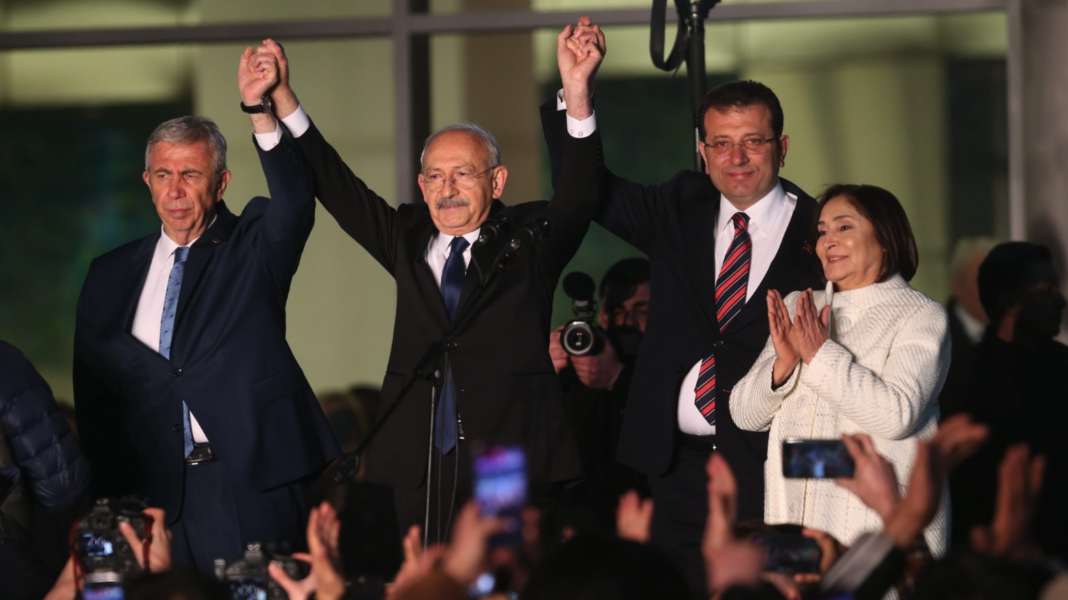President Tayyip Erdogan faces the biggest test of his 20-year rule in May elections that will decide not only who leads Turkey but how it is governed, where its economy is headed and what role it may play to ease conflict in Ukraine and the Middle East. Reuters reports on March 7, 2023.
Erdogan has signalled the presidential and parliamentary votes will take place on May 14, three months after powerful earthquakes struck Turkey’s southeast, killing tens of thousands and leaving millions homeless.
The opposition picked as its presidential candidate Kemal Kilicdaroglu, leader of the Republican People’s Party (CHP), and formed an alliance aiming to appeal to voters from the left and right, as well those with Islamist roots.
The opposition promises to reverse many of the policies of Erdogan, who has championed religious piety, military-backed diplomacy and low interest rates.
The most powerful leader since Mustafa Kemal Ataturk founded the modern Turkish republic a century ago, Erdogan and his Islamist-based AK Party have shifted Turkey away from Ataturk’s secular blueprint.
Erdogan has also centralised power around an executive presidency, based in a 1,000-room palace on the edge of Ankara, which sets policy on Turkey’s economic, security, domestic and international affairs.
Critics say his government has muzzled dissent, eroded rights and brought the judicial system under its sway, a charge denied by officials who say it has protected citizens in the face of unique security threats including a 2016 coup attempt.
Economists say Erdogan’s calls for low interest rates sent inflation soaring to a 24-year high of 85% last year, and the lira slumping to one tenth of its value against the dollar over the last decade.
… AND THE REST OF THE WORLD?
Under Erdogan, Turkey has flexed military power in the Middle East and beyond, launching four incursions into Syria, waging an offensive against Kurdish militants inside Iraq and sending military support to Libya and Azerbaijan.
Turkey also saw a series of diplomatic clashes with regional powers Saudi Arabia, Egypt, the United Arab Emirates and Israel, as well as a stand-off with Greece and Cyprus over eastern Mediterranean maritime boundaries, until it changed tack two years ago and sought rapprochement with some of its rivals.
Erdogan’s purchase of Russian air defences triggered U.S. arms industry sanctions against Ankara, while his closeness to Russian President Vladimir Putin led critics to question Turkey’s commitment to the NATO Western defence alliance. Ankara’s objections to NATO membership applications from Sweden and Finland have also raised tensions.
However, Turkey also brokered a deal for Ukrainian wheat exports, underlining the potential role Erdogan has staked in efforts to end the Ukraine war. It is not clear that a successor would enjoy the same profile he has created on the world stage, a point he is likely to stress in the election campaign.
WHAT ARE THE OPPOSITION PROMISING?
The two main opposition parties, the secularist Republican People’s Party (CHP) and centre-right nationalist IYI Party, have allied themselves with four smaller parties under a platform that would reverse many of Erdogan’s signature policies.
They have pledged to restore independence to the central bank and reverse Erdogan’s unorthodox economic policies. They would also dismantle his executive presidency in favour of the previous parliamentary system, and send back Syrian refugees.
Erdogan supported failed efforts to topple Syrian President Bashar al-Assad, while hosting at least 3.6 million Syrian refugees who have become increasingly unwelcome amid economic hardship in Turkey.
The opposition has echoed Erdogan’s plans to return some refugees to Syria, but neither has set out how that could safely take place.
WHAT IS NEXT?
Erdogan is set to formally announce the election decision on March 10 that will kick off campaigning for what polls suggest will be a tight race.
While the first of Erdogan’s two decades in power was marked by surging economic growth, the last 10 years have seen a decline in prosperity which has hit his popularity with voters.
Initial polls since the quakes had suggested that Erdogan was able to largely retain his support despite the disaster. But the emergence of a united opposition, even after a delay in picking its candidate, could prove a bigger challenge for him, analysts say.
How the opposition will garner support among the Kurdish voters, accounting for 15% of the electorate, remains key. The co-leader of the pro-Kurdish Peoples’ Democratic Party (HDP) said they may back Kilicdaroglu after a « clear and open » talk.

